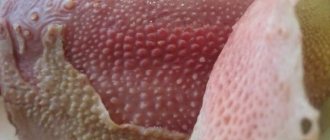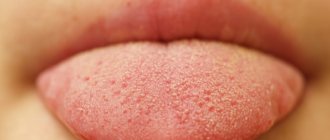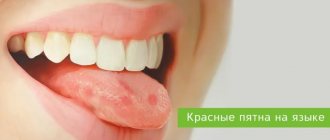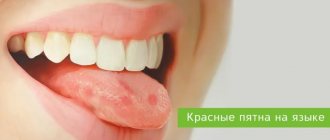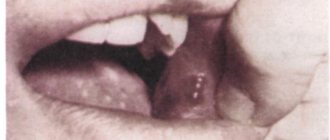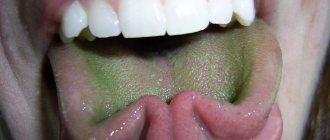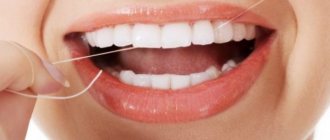Inflammation of the gastric mucosa caused by poor diet, negative effects of bacteria, and alcohol abuse is called gastritis. Types of gastritis are manifested by various symptoms, one of which is plaque on the tongue. This symptom may belong not only to gastritis, but also to other diseases of the gastrointestinal tract and other organs.
These can be liver pathologies, dehydration, side effects of medications, as well as intoxication and dyes from food products. In order to correctly diagnose the plaque that appears on the tongue during gastritis, you need to become familiar with the features of this symptom.
What does a healthy tongue look like?
The tongue is pale pink - absolutely healthy.
Diagnosis by the appearance of the tongue was mastered by ancient healers, who believed that a disease could not be considered cured until the patient’s tongue regained its previous appearance. The tongue of an absolutely healthy person has the following signs:
- Pale pink color;
- Small taste buds without pronounced features;
- No bad breath;
- Be moderately moist;
- The presence of a small amount of translucent bright pink coating is allowed;
- There is no unpleasant odor.
If you deviate from these signs, you should consult a general practitioner or gastroenterologist and undergo the examination prescribed by him.
The appearance of such formations has various reasons and factors.
- Decreased immunity.
- Dental diseases (gingivitis, stomatitis, caries, periodontitis, etc.).
- Infectious diseases.
- Gastrointestinal problems.
- Infection of the body with helminths.
- Pathologies of the heart, lungs, thyroid gland.
- Taking medications, etc.
In difficult cases, when plaque is one of the accompanying symptoms of serious diseases, consult a doctor. The disease must be identified and cured, otherwise no means to improve the microflora will help.
Signs of deviations from the normal state of the tongue
It is quite possible that, once you look at your tongue, you will see a rather unsightly picture. Symptoms of deviation from the norm:
- A coating of various colors, thicknesses, and with different locations of spots appears on the back of the tongue;
- The sides of the tongue are bright red;
- The taste buds look uneven, some of them increase in size and begin to disturb with unpleasant sensations, taste sensations change, their intensity weakens;
- The oral cavity becomes unusually dry;
- In some cases, the appearance of pain and burning is diagnosed;
- There is an unpleasant odor from the mouth;
- After cleaning the tongue, the plaque appears again after a short time.
In the plaque that appears on the tongue, laboratory testing can reveal leukocytes, pathogenic microflora, and exfoliated epithelial cells.
This video will tell you about plaque on the tongue due to gastritis:
Children's diagnostics
A comprehensive examination will help determine the cause of yellow spots on the tongue.
A visual examination of the oral cavity alone is not enough to identify the true causes of the formation of yellow plaque.
Without additional diagnostics, even the most highly qualified physician cannot cope with this task. This is due to the fact that this symptom may indicate the presence of a wide variety of disorders.
That is why a comprehensive examination is carried out, a complete clinical picture is outlined and more in-depth studies are prescribed by a pediatrician, specialists in the field of gastroenterology, and dental care.
Diagnosis of diseases of the gastrointestinal tract by language
The tongue will tell you about gastrointestinal diseases.
Modern gastroenterology does not specialize in diagnosis based on the appearance of the tongue. However, an attentive person suffering from such pathologies can distinguish the symptoms of gastrointestinal diseases:
- Acute gastritis - a viscous, dense coating of white-gray color is visible on the entire surface of the tongue, with the exception of the tip and side parts. The mouth feels dry and has an unpleasant acidic taste. Perhaps, instead of dryness, increased salivation will appear. In acute gastritis, similar symptoms include heartburn and sour belching, cutting pain in the epigastric region 1-2 hours after eating, weakness, headaches, diarrhea, heaviness in the stomach. With inadequate treatment, acute gastritis becomes chronic.
- Chronic gastritis - light deposits on the tongue are replaced by occasional dark gray deposits. To the previous symptoms are added such characteristic signs of chronic gastritis as astheno-neurotic syndrome, constant irritation, aching pain that intensifies some time after eating. About 40% of all cases of acute gastritis become chronic. This condition is fraught with the spread of the process to the duodenum and the development of gastroduodenitis.
- A stomach ulcer in combination with gastritis affects the condition and appearance of the tongue - its surface becomes bright red, with gray spots of dense plaque that are difficult to clean. This picture is complemented by signs of stomatitis and cyanosis. The patient feels a burning sensation and the production of saliva increases.
- Oncological damage to the gastrointestinal tract, as well as the presence of internal circulation, is reflected in the condition of the tongue by the appearance of evenly spaced white plaque of increased viscosity, excessive saliva production, and a burning sensation in the oral cavity.
When is yellow tongue normal?
The appearance of a light yellowish coating in the mornings in summer is normal. This usually indicates a feeling of thirst that the body experiences. This plaque disappears after drinking a glass of water. Plaque formed after eating foods containing dyes: yellow lemonade or ice cream, carrots, sweets, citrus fruits is also considered normal.
The tongue may turn bright yellow from taking certain medications, for example, Furazolidone or Nitroxoline. In pregnant women, yellow plaque may appear in the later stages due to the development of duodenogastric reflux caused by fetal pressure. In all other cases, the appearance of yellowness in the mouth should give cause for concern.
Differentiation of plaque in gastritis from other diseases of the gastrointestinal tract
A thick, grayish coating is characteristic of dysentery.
It is important to suspect the onset of a dangerous disease in time. To take action and prevent complications from occurring. Differential diagnosis by tongue of gastritis from other diseases and conditions:
- A thick, grayish coating is characteristic of dysentery. In this case, the tongue looks cracked, and less saliva is produced than usual.
- Desquamative glossitis - this type of inflammation of the tongue is characterized by such symptoms as red spots of complete absence of epithelium or several altered taste buds on the tongue, covered with a white coating.
- Galvanic stomatitis is a form of inflammation of the tongue that arises as a result of a reaction to metal prostheses, manifested by spots in the form of pimples, and subsequently by the appearance of erosions against a background of white plaque.
- Infectious diseases - sore throat, scarlet fever, diphtheria, HIV infection can cause the appearance of a white coating on the tongue, but almost all of these infections are accompanied by high fever and skin rashes.
- Diseases of the heart and blood vessels - plaque is located on the anterior third of the tongue.
- Kidney disease - plaque on the tongue is localized at the back along the edges.
- Endocrine disorders - under the plaques of white plaque there are ulcers and erosions.
- Anemia is not a coating on the tongue, but blanching of the entire surface of the organ. Diseases of the respiratory system are often indicated by the localization of white plaque on the front and along the edges of the tongue.
- Diseases of the salivary glands - the appearance of a white coating is accompanied by the appearance of an unpleasant odor.
- Diseases of the liver and gall bladder - the color of the plaque is not white, but has a yellowish or brown tint. A white coating on the tongue can be caused by the consumption of dairy products, as well as the proliferation of bacteria and fungi in those who abuse sweets. Unlike plaque during gastritis, such layers are easily removed and do not form further.
What diseases does yellow plaque indicate?
Pathological yellow plaque can vary in saturation, shade, consistency, and location. Tongue color and pathology:
| Illustration | Description |
| Yellow-green - problems with the outflow of bile. | |
| Yellow-brown is a sign of sore throat. | |
| Yellow-white indicates mainly intestinal infections, poisoning and may be a sign of the presence of parasites. | |
| Pale yellowish and orange - gastritis. | |
| Black and yellow - Crohn's disease or gallbladder pathology. |
Is plaque on the tongue dangerous - how to treat it
An ultrasound of the stomach will help clarify the diagnosis.
Plaque itself does not pose any threat to health. As soon as the underlying disease is cured, the condition of the tongue will return to normal.
As for gastritis, long-term treatment with careful adherence to the recommendations of a gastroenterologist will help relieve its symptoms.
Perhaps the doctor will conduct research aimed at clarifying the diagnosis: FGDS, ultrasound of the stomach, laboratory tests of blood and gastric juice. The following drugs will be prescribed as treatment:
- Antibiotics of 2-4 types, taken in combination:
- Pro- and prebiotics;
- Vitamins;
- Antacids;
- Proton pump blockers.
Patients with gastritis must follow a strict diet aimed at sparing the gastric mucosa and not provoking the release of excessive amounts of hydrochloric acid. With this treatment, not only the gastric mucosa, but also the condition of the tongue will definitely return to normal.
Treatment
Treatment options vary greatly depending on the diagnosis. The following medications are prescribed:
- choleretic: choleretics accelerate the movement of bile - “Allohol”, “Cholenzim”, corn silk, cholekinetics improve the contractile activity of the gallbladder - “Magnesia”, “Sorbitol”;
- for the treatment of sore throat and stomatitis, with exacerbation of cholecystitis, inflammation of the biliary tract, antibiotics are prescribed - Amoxicillin or others;
- during long-term antibiotic therapy, probiotics are prescribed to restore the microflora - “Linex”, “Hilak-Forte”;
- hepatoprotectors restore liver cells - “LIV 52”, “Heptral”, “Karsil”;
- antiviral for hepatitis - “Velferon”, “Reaferon”;
- if helminths are detected, anthelmintics are prescribed - “Pirantel”, “Vermox”;
- antacids are prescribed for duodenogastric reflux - “Almagel”, “Rennie”, “Gastal”;
- central dopamine blockers restore motor activity of the gastrointestinal tract during duodenogastric reflux - “Metoclopramide”, “Cerucal”;
- for acute respiratory viral infections, ENT pathologies, and influenza, you will need anti-inflammatory drugs - Ibuprofen, Nurofen;
- for fungal infections, use “Chlorhexidine”, “Miramistin”, “Griseofulvin”, “Fluconazole”;
- solutions of glucose and electrolytes are traditionally used to reduce intoxication;
- in case of poisoning, sorbents are also prescribed to remove toxins - Enterosgel, Smecta.
Diet is of great importance for the treatment of gastrointestinal and liver diseases. For example, for liver pathologies, the main table is No. 2, for exacerbations - No. 1a and No. 1 according to Pevzner. However, in any case, you need to exclude fatty, spicy, and fried foods from your diet. When the functioning of the gastrointestinal tract is normalized, the normal color of the tongue will be restored by itself.
Products for daily tongue hygiene
You need to brush your tongue at least 2 times a day. It is not advisable to use a regular toothbrush, since high and medium hard bristles can injure the soft surface and cause a gag reflex. At home, it is safer and more convenient to use special devices. They do not have a significant functional difference, so when choosing, you can only be guided by personal preferences.
Today, you can easily purchase products from well-known brands Curaprox, Dentaid, Jetpik, One Drop Only, Miradent, Pierrot, etc. The range of products from different manufacturers includes everything you need for complete, high-quality oral care.
Scrapers
resemble a spatula. A simple design can be made of silicone or plastic, less often of metal and wood. This easy-to-use device gently cleanses the surface of the tongue without causing a gag reflex. The scraper blades conform to the shape of the tongue and are easily washed with water.
How to clean correctly
After the usual hygiene procedure with teeth and rinsing the mouth, they begin to remove plaque. Using smooth but intense movements from root to tip, remove plaque first from one half and then from the other half. The next stage is movements across the tongue. At the end of the procedure, you must rinse your mouth thoroughly.
Persons with digestive diseases and smokers require additional use of paste when removing plaque.
Solving the problem of a coated tongue helps prevent the risk of caries, gingivitis, stomatitis, provide fresh breath and improve the perception of taste.
This article is for informational purposes only, please consult your doctor for details!

